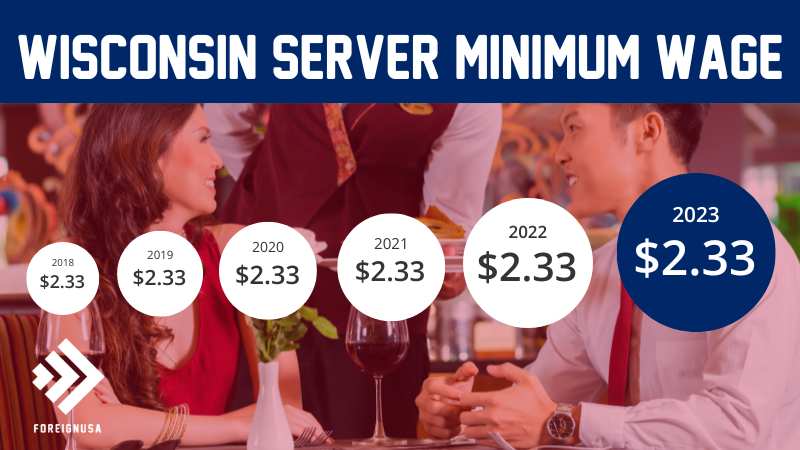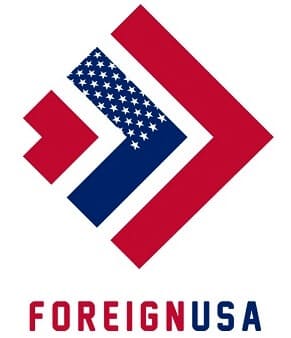If you work as a server in Wisconsin or would like to get into the industry, then you should be aware of what the minimum wage is for servers in Wisconsin to ensure you are being paid the correct amount, or whether this is a job you would like to do.
The Wisconsin server minimum wage rate in 2023 is $2.33 per hour.
The minimum wage laws surrounding this act as a safety net for servers that may not earn enough in tips to meet the minimum wage threshold in Wisconsin.
Servers are essential to the hospitality industry and they serve their customers with food and beverages in a restaurant or similar type of business where food and drinks are delivered to the table. As part of providing this service, a server will typically receive tips (gratuities) for doing so.
Wisconsin servers usually rely less on their low hourly tipped minimum wage and more on the generosity of the guests they serve for their paycheck each week.
Server Minimum Wage in Wisconsin 2023
What is the actual minimum wage for a server in Wisconsin? The minimum cash wage for servers in Wisconsin is $2.33 per hour which is the same as the tipped minimum wage in Wisconsin.
This is the minimum per hour a Wisconsin server must pay and a Wisconsin employer must pay its servers.
As you can see from the following graphic, the minimum wage for servers in Wisconsin has not increased over the past several years.

Server Minimum Wage in Wisconsin – Minimum Cash Wage and Tip Credits
$2.33 per hour is not much to be paid an hour, but if a server’s tips are not sufficient enough Wisconsin law requires that servers must be supplemented by their employers via “tipped credit”, which is, in Wisconsin’s case, $4.92 per hour, making the server minimum wage in Wisconsin a total of $7.25 per hour.
The regular minimum wage in Wisconsin for all types of employees follows the federal minimum wage guidelines that have been in their current form since 2008.
Based on the tipped minimum wage laws, Wisconsin employers are required to pay their employees an hourly minimum cash wage with the addition of tip credits.
What tipped credits allow employers to do is pay tipped employees less than the minimum wage so long as they can make up at least the difference via tips per hour during each working week.
Tip credit not only allows server employees to be paid less than the minimum hourly wage, but it is also the same concept with bartenders, hotel workers, airport attendants, other workers in the hospitality industry, and most other roles where tips are the primary income for the employee.
In Wisconsin, servers must be paid a base minimum cash wage of $2.33 per hour. The expectation is that Wisconsin servers and other tipped employees will make at least an additional $4.92 per hour in tips on average across a working week, and if they do, then the employer is only obligated to pay a Wisconsin server $2.33 per hour.
Let’s assume that a server in Wisconsin does not make at least $4.92 per hour in tips as an average over the course of a working week, then the employer must step in and pay the Wisconsin server a tip credit of up to $5.12 per hour, so the server makes a minimum of $7.25 per hour for the duration of the working week.
Fair Labor Standards Act (FLSA) and Tipped Employees
The Federal Fair Labor Standards Act, also known as the FLSA, is a federal law from the U.S. Department of Labor.
This law establishes a national minimum wage, defines classifications for employees, and covers other essential standards and requirements for employers.
Federal law requires that employers make tipped employees aware of the cash wage paid (currently, the national direct hourly salary is $2.13 per hour), let them know about the tip credit, and explain any tip pooling systems at the workplace.
Wisconsin Server Minimum Wage History
The table below showcases the current rate and history of the Wisconsin server minimum wage over the past few years.
You can see when there were increases in the server minimum wage, which includes not only the tipped minimum wage rates but the tipped credit rates too.
| State | Tipped Server Wage | Tip Credit | Total |
|---|---|---|---|
| Tennessee Server Minimum Wage 2023 | $2.33 | $4.92 | $7.25 |
| Tennessee Server Minimum Wage 2022 | $2.33 | $4.92 | $7.25 |
| Tennessee Server Minimum Wage 2021 | $2.33 | $4.92 | $7.25 |
| Tennessee Server Minimum Wage 2020 | $2.33 | $4.92 | $7.25 |
| Tennessee Server Minimum Wage 2019 | $2.33 | $4.92 | $7.25 |
| Tennessee Server Minimum Wage 2018 | $2.33 | $4.92 | $7.25 |
| Tennessee Server Minimum Wage 2017 | $2.33 | $4.92 | $7.25 |
| Tennessee Server Minimum Wage 2016 | $2.33 | $4.92 | $7.25 |
| Tennessee Server Minimum Wage 2015 | $2.33 | $4.92 | $7.25 |
| Tennessee Server Minimum Wage 2014 | $2.33 | $4.92 | $7.25 |
| Tennessee Server Minimum Wage 2013 | $2.33 | $4.92 | $7.25 |
| Tennessee Server Minimum Wage 2012 | $2.33 | $4.92 | $7.25 |
| Tennessee Server Minimum Wage 2011 | $2.33 | $4.92 | $7.25 |
| Tennessee Server Minimum Wage 2010 | $2.33 | $4.92 | $7.25 |
| Tennessee Server Minimum Wage 2009 | $2.33 | $4.92 | $7.25 |
| Tennessee Server Minimum Wage 2008 | $2.33 | $4.17 | $6.55 |
Average Server Salary in Wisconsin (2023)
If you are a server or are looking to work as a server in a restaurant or similar service-related business in Wisconsin, knowing the hourly wage for servers is incredibly important, but knowing what you can expect to earn is perhaps even more important for your well-being and livelihood.
Most Wisconsin servers do not take a position at a restaurant, hotel, or cafe assuming they can only earn $7.25 per hour, because based on working 35-40 hours a week, they could only earn about $254-$290 per week before taxes.
What Do Servers Get Paid in Wisconsin
The average server hourly wage in Wisconsin according to the job website Indeed is $16.00 per hour. So, if you were to work an 8-hour shift or a total of 8 hours in a day across a couple of shifts, you could earn (on average) about $128 (8 hrs x $16.00) a day. If you worked five days per week, you could earn about $640 per week as a server in Wisconsin.
If you took just two weeks off a year and worked for 50 weeks you could potentially earn $32,000 before taxes. If you decided to take 3 weeks off per year then you could potentially earn 49 x $640 = $31,360 for the year. This, of course, is before Wisconsin income tax has been deducted and any federal taxes that you may incur on your income.
The above calculations are just averages to give you an idea of roughly what you could earn as a Wisconsin server.
The most important aspects of how much you can earn will depend on how good you are at your job, your experience level, what type of food/beverage establishment you work at, and how busy the restaurant/cafe/hotel or bar is.
Also, many tipped employees that work at restaurants or similar establishments are willing to work more than 40 hours per week which may make them qualify for overtime pay.
You also need to be working at a business that has enough work to keep you busy for 40 cumulative hours of shifts each week to potentially earn a good living as a tipped worker.
Final Thoughts
If you are a Wisconsin employer, it is your responsibility to pay your servers a minimum hourly rate + tip credit that at least equals the Wisconsin minimum wage in the event that your servers do not earn enough to meet the $7.25 per hour threshold. By failing to do so you could be breaking federal and state laws.
Equally, it is important that as a server working in Wisconsin, you know your rights and how much you should be paid each week based on your hourly wage and tip credits.
If you have specific questions about the laws surrounding the minimum wage for servers in Wisconsin (tipped employees) from both an employer and employee perspective, you can contact the Wisconsin Department of Workforce Development. Additionally, if you are an employee who isn’t being paid what you legally should be, you can file a complaint with them too.
The Wisconsin Department of Workforce Development is located at 201 E. Washington Ave, P.O. Box 7946, Madison, WI 53707, and their phone number is (608) 266-3131.


